"Time raises havoc with memory. But whoever knew Enzo Sereni, even briefly, is not likely to have forgotten him. His friend's smile when they talk about him as if a certain essence of his nearness still remains in the air" (from the introduction to Ruth Bondy's book The Emissary- A life of Enzo Sereni, translated from Hebrew by Shlomo Katz, Kindle edition, location198).
The Sereni Family:
According to tradition, the Serenis had arrived in Rome in days that even preceded the destruction of the second temple. The family members built their home on Cavour street in 1870, After the gates of the ghetto had been opened and Jews could flee it. The building, built within a walking distance from the ghetto, populated the members of the extended family. Ruth Bondy wrote: "All Italians, and Italian Jews in particular, regarded the family as a fortress and shield against the unfriendly outside world. The family was the basis of their existence and the center of their life- assurance against all troubles. Two, three, and even four generations, uncles and cousins, lived together, worked together, and brought up their children as a group (Bondy, location 301).
Samuel Sereno, Enzo's father, was a medical doctor, and the queen mother, who was impressed by his devoted treatment of patients suffering from pulmonary disease- made sure he would join the medical staff of the royalty palace. In addition to his work as a physician, he was a history lecturer at the university.
Samuel married Alfonsa Pontecorvo, a member of a family that had been deported during the expulsion of the Jews from Spain. Alfonsa was the smart sister. The beautiful sister, Ermalinda, married Samuel's brother, Angelo Sereni, who headed Rome's Jewish community for 36 years. Angelo escorted Sokolow to a meeting with the prime minister and was involved in Zionist lobbying. Ermalinda used to host key figures of the Zionist movement in the spacious living room of their house. The domes of Rome, as well as its roofs, towers and the Palatine Hill- Rome's emperors' residence- were visible from the balcony.
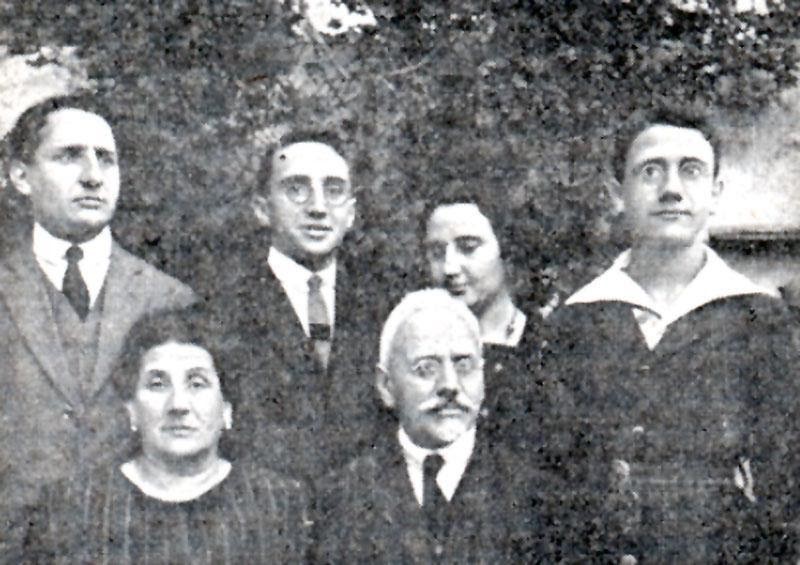 |
|
Alfonsa, Samuel and their four children
|
The two families lived on the same floor in separate apartments connected by a door. They used to meet every evening. Angelo and his wife did not have children and Samuel and Alfonsa had three boys and one girl. The three boys were recognized as geniuses from an early age and were permeated with burning ambition. Alfonsa recounted that once she had attended a lecture given by the minister of agriculture with the nine-year-old Enzo. After the speech had ended, the boy approached the minister, shook his hand and expressed his admiration by saying: "you expressed my thoughts exactly".
Childhood and youth in Rom
In 1,917, Enzo's brother, Enrico, enlisted to the army during the first world war, in which the Italians joined forces with England and France. Enzo was eager to fight and yearned for the outbreak of another war so he could protect his homeland as well.
Thoughts about death preoccupied the sensitive child from an early age and by the age of 12 he had already prepared a will in which he donated his books and the allowance that he had saved. He found school boring, but his knowledge enabled him to teach his classmates and occasionally even substitute his teachers.
In his youth he became addicted to frantic outbursts of writing, and in his diary he used the styles of Dante, Carducci and D'Annunzio and wrote: "A heroic poem on the theme of Garibaldi; a novel named The Duty; a novella, Three Sisters; a comedy, Desire; and a plan for a play 'about a blinded soldier who marries a beautiful woman whom he had known before the war; she is unfaithful to him and he commits suicide'. His subjects were always huge and elevated- love, treason, heroic death" (Ibid. location 587 to 589).
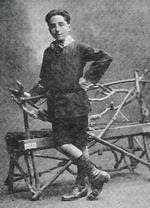
"The process of growing up pressed heavily on him with its sense of total aloneness: pointless quarrels with members of the family; disgust with deeds performed secretly and entirely contrary to the visions of higher purity which he demanded from the heroes of his writings, such as swiping cookies from pastry shops without paying for them; worry over "low" dreams, weariness of the struggle against lust, "that oppressive thing called flesh"; and also pain over unrequited love and feelings of inferiority because he did not know how to behave in the company of girls, either showing off or being too shrinking. Study and reading seemed to provide the sole remedy, but even after indulging in this therapy he still felt "confused before the glance of a woman"" (Ibid. locations 600 to 613).
"The sorrows of growing up, along with the Italian trait of looking at life through an aesthetic veil and regarding life itself as a form of art, added to the Jewish veneration of the written word, together combined into an intoxicating brew. The Sereni home was filled with books (Ibid., location 623). In the Hebrew addition of her book, Bondy also mentions how at the age of fourteen Enzo was allowed to visit the library on a regular basis and referred to that day, in his diary, as one of the happiest in his life (Bondy Hebrew version: page 43-44).
Alfonsa gave her children diaries to write what is on their mind, but she also used it to track their inner life. Enzo referred to himself in his diary in the third person:
"Judging by the skeptical smile always on his face one might conclude that it indicates contempt, but I have seldom found anyone among the young people who so easily becomes enthused and is less capable of satire. He often commits blunders, but these are aesthetic." (Ibid., location738).
In another diary entry he adds: "I do not know why, but Sereni always leaves me with a sense of emptiness. In all his appearances there is a disproportion between the man and his ideas, between the ideas and his actions. Shaken by the persistent hammering of his words, which seem to be addressed to a political rally, I feel a void, as if he uprooted all the weeds that grew in his garden but failed to grow anything else." (Ibid., location 747 to 758).
In the Hebrew version of her book, Bondy mentions additional observations Enzo made about his own personality. He describes himself as exceeding any statesman intellectually but lacking one trait that is crucial for political life: the ability to hold one's ground in a fight and never give up. The problem lies in his fear of being ridiculed. He also mentions other political virtues he was gifted with: fluent speech, a power of persuasion, a quick perception of political facts. However, he concludes that above all, he has an artistic character (Bondy Hebrew version, pages 52 -53).
Ada Ascarell
From his youth, Enzo would frequently fall in love. However, he lacked the necessary communicative skills for creating rapport with the girls who preoccupied his imagination. The sexual lust pressed heavily on him: "Sexual lust troubled Enzo deeply now and he struggled with it as best he could, crying out. "Oh, this filthy lust! I am a pig!" It was such a distortion of the elevated vision of pure love he felt toward the girls who casually crossed his path…. (Ibid., location 513)".
Toward the end of 1,919 Alfonsa transferred Enzo to a different gymnasium with the hope that his wisdom and knowledge would not be worshiped there. Enzo embraced the transition due to a case of unrequited love in the old school but Alfonsa was about to be disappointed: Enzo's knowledge and intellect made an impression in the new school as well. For his part, he was pleased with the transition, because in the new Gymnasium he had met a girl named Ada Ascarelli. Ada- his relative on both sides, had a short stature, a sweet round face, big brown eyes and a long black braid.
Her father was a wealthy merchant who exported the sheep cheese Pecorino to the U.S.A and owned giant sheep herds in Sardinia. Her mother was a meticulously dressed woman with aspirations to marry her daughter to a rich man who would provide her with the same luxurious lifestyle in the high society of Rome that she had. Ada lived in her own private apartment that included a living room and a bathroom and was located inside her parent's house. Her beloved father died when she was 14. she was then left with her mother with whom she did not have the special relationship she had had with her father. Unlike her friends, she found the brilliant and opinionated Enzo intriguing, although the way he dressed and the fact that he paid no attention to his outward appearance did bother her, at least initially. The fashionable Ada always made sure she was impeccably dressed.
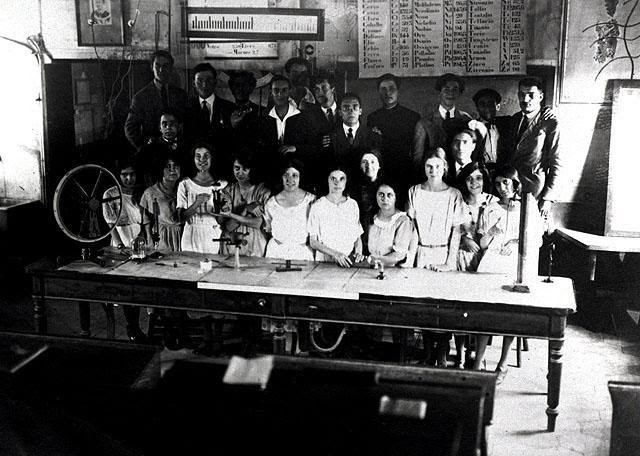 |
|
At school: Enzo is in the middle row wearing a tie and Ada is sitting fifth from the right with her hands on the table.
|
|
In those days, it was not common for a girl who comes from a good background to roam the streets with a boy for no reason. Therefore, Enzo would escort Ada to school. In the Hebrew version of her book, Bondy describes how he wrote in his diary that Ada penetrates ever more deeply into his thoughts, and that he longs to be in her vicinity (Bondy Hebrew version, page 60).
Zionism
Enrico, the older brother, decided to become a scientist and not a physician like his father, and before he started his studies, he had gone on a trip to Germany and Austria. In a bookstore specializing in Jewish books, he noticed an add announcing the impending gathering of the 12th Zionist congress that was due to take place in Carlsbad in 1,921 (the first one after the first world war). He wrote to his family that he intends to attend the congress and that he might come back an ardent Zionist. Enrico had stayed in Carlsbad throughout the entire congress and came back duly impressed, albeit not a 'Zionist'. Ten years later, Enzo would participate in the Zionist congress and remember his brother's postcard, which had been the milestone for a new chapter in his life.
Dr. Moses Beilinson, a disciple of Russian culture who replaced Communism with Socialist Zionism, actively participated in the two revolutions of 1905 and 1917 but was disillusioned with the Bolsheviks. At age 32 he left Russia and settled for a while, on his way to Israel, in Italy, where he tried to garner support for the Zionist movement. Beilinson and the botanist Dr. Israel Reichert tried to recruit youth who were considered opinion leaders, and among them was Enzo, who was known as Angelo Sereni's nephew.
Reichert met Enzo and the conversation between the two lasted for hours while they were walking through the streets of Rome, discussing the teachings of the prophets and the building of a new society based on equality and justice: "By the time dawn rose over the bell towers of Rome, it was Enzo who was speaking about Eretz Israel, and he expressed his wish to commence the creation of a pioneering movement in Italy at once, for time was pressing" (Ibid., location 958).Two days later, the first assembly of 'Avoda' union was held at the Serenis' house, and the barely 17- year-old Enzo was elected secretary.
During their walks, Enzo started to draw Ada closer to Zionism. However, her mother vetoed Ada's participation in Zionist activities, fearing that 'intellectual dreamers' of the Sereni kind would hamper her plans to marry her daughter to a wealthy industrialist.
For Enzo, Zionism was bound together with drawing closer to Judaism, and he started to keep the commandments, albeit lightly. Enzo and his younger brother Mimo asked for a kosher kitchen in their house, visited the synagogue, avoided driving on Saturdays, and wore a yarmulke while dining, even in public places. To those who asked him how he can square this lifestyle with his objection to clericalism- Enzo replied that in his opinion cleaving to faith and tradition plays a stabilizing role in the building process of the forthcoming new Jewish state.
In July 1922 he had finished his studies with distinction and started learning philosophy at the University. Ada wanted to study natural science but eventually opted for literature because the literature faculty was closer to where Enzo was studying.
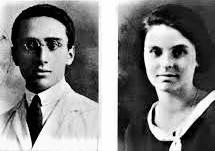 |
|
Ada and Enzo as students
|
In the meantime, Enzo succumbed to despair with regards to his dream of becoming an author and writing a big novel about several generations of his family. Bondy mentions that he was fully aware he was not destined to be an artist but still hoped to become one someday (Bondy Hebrew version, page 81).
The Immigration to the Land of Israel
In October 1,922, the Fascists marched to Rome, and Mussolini became the duce in a dictatorial regime. A Zionist delegation headed by Moshe Beilinson was permitted to meet the duce, who at the time showed no anti-Semitic inclinations. At the meeting, the subject of 'the British Imperialism' was discussed, and Mussolini promised them to meet Weizmann when the latter visited Rome. The promise was kept. Enzo was covertly active in the anti-Fascist underground and the growing power of the Fascist movement helped to "cure" him of his love for Italy.
Enzo traveled in August 1,923 to the Zionist congress in Carlsbad. He fell under the spell of Zionism even though he barely understood Yiddish and Hebrew, the languages in which the discussions were held. "His choice had been made- not without pain. And having made his choice, he extended it all along the line. If it were to be Zionism, then it must be pioneering; and if pioneering, then it meant immigration to the land of Israel, together with Ada. Ada knew that they would get married some day after Enzo had finished his studies and become independent, and she was reconciled to both Zionism and immigration to Palestine, but she drew the line in religious matters: they were not to have a kosher home, nor religious upbringing for children" (Ibid., location 1184).
Despite his support of Zionism and his resistance to the Italian regime, he fulfilled his duty as a member of an ancient Roman family and served one year in the Italian army.
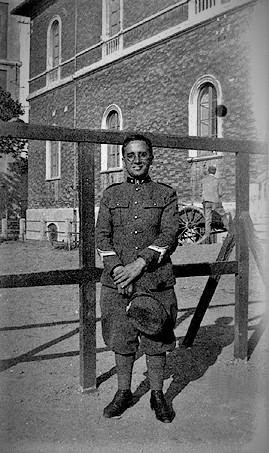 |
|
A soldier in the Italian army
|
Ada got pregnant and the incident caused a scandal. In 1926 Hannah was born after her parents had hastily married. The couple immigrated to Israel in 1927 but their parents demanded that Hannah would stay with them, at least until the conditions in the faraway land were made clear. Enzo chose the name Haim after Haim Weizmann, who inspired him, whereas Mimo chose the name Uriel after Uriel De-Costa, the rebellious heretic philosopher who took his own life after he had been ostracized.
Within a society that turned its back on its past, Enzo was unique in his quest to build a bridge to Jewish tradition. In addition, he believed in a higher force and kept several commandments. "It was this many-colored aspect of his character that enabled Sereni to impress all those who knew him, each in accordance with his individual tastes. For he was a Socialist and a believing Jew, a man of politics and a philosopher, a dedicated emissary and a sober and skeptical person, an educator, and a man capable of enjoying all the pleasures of life. He exerted a magnetic influence on people and at the same time could be self-enclosed and silent about the secrets of his being. He contained a great abundance and generously bestowed it on others, sometimes in order to surprise and impress, like a true Roman he loved drama and the dramatic entrance" (Ibid., location 265 to 274).
In the Land of Israel
Moshe Sharett wrote about the unique nature of Ada and Enzo's immigration to Israel and noted that the path they had to tread was psychologically more arduous than the one travelled by other immigrants. Despite this, they passed it at lightning speed. Sharett stressed that over many generations Jews immigrated to the land of Israel in groups and tribes, bringing their best traditions with them: family relations, cultural assets, memories, past habits and friendships, All of which retained something of the previous lives the immigrants led in their countries of origin. This was not the case with Enzo and Ada. They were lonely, uprooted from their familiar environment and lacked any prior connection to the new environment they found themselves in. With sheer will power, without the help of friends, they made the revolutionary transition: They tore themselves from their natural habitat and replanted themselves in the country they longed for. Sharett concluded that others may have followed them, but Enzo and Ada were the pioneers (See Sharett).
Moshe Beilinson was the first acquaintance Enzo had in the land of Israel. Beilinson introduced him to Berl Katznelson, who found the young Italian intellectual intriguing.
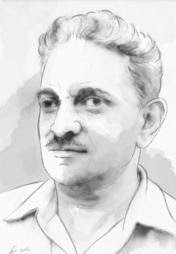 |
Moshe Beilinson (from the Ben-Yehuda project) |
It was a time of severe economic crises and shortage of jobs and Berl asked Moshe Smilansky to hire Enzo as a worker in his orchard. Smilansky, one of the notable figures of the First Aliyah who had good relationships with the leaders of the Second Aliyah agreed to hire Enzo upon Berl's request, even though he did not really need an extra worker. Smilansky could not fathom what the tender-handed philosophy professor hopes to find in his orchard, but Enzo, who aspired to a productization of the Jewish people insisted to become a laborer.
Enzo showed up for work wearing a suite and tried to work with a hoe as hard as he could until he almost stumbled. Smilansky, who was a tough employer, transferred him to an easier job in pruning together with Yona Kosoi- another intellectual who Smilansky didn't believe would last. Enzo approached the pruning job with the same earnestness and concentration he devoted to Kant's philosophy. He learned to accommodate his clothes to the new situation, and during the long hours of mechanical and monotonous labor he used to recite out loud whole sections from Dante's Divine Comedy, as well as long poems of various Italian poets. Kosoi was duly impressed after Enzo had begun reciting Ze'ev Jabotinsky's translation of the Divine Comedy. Their employer, Smilansky, who aspired for coexistence with the Arabs, employed Arabs and Jews alike, in line with Enzo's world view. The twenty-three-year-old Enzo, who was married and a father to a girl, appeared to the other pioneers as the responsible adult. While he was accumulating friends, as well as social and political influence, Ada remained lonely. Nobody around her knew Italian, ancient Greek or Latin and she spoke neither Yiddish nor Hebrew. She had no friends and the living conditions, which were hard for everyone, were all-the-more unbearable for someone from a wealthy Roman background.
When they had managed to rent an apartment with indoor toilet, Ada went to Italy to bring their daughter and Enzo's library: "Visiting in Rome was like landing on another planet. There life proceeded as usual, people sat in cafés along the corso, elegant ladies drove by in chauffeured cars, the streets were lit brightly, and the Serenis gathered daily at Aunt Ermalinda's on Cavor Street" (Bondy, location 1532).
Givat Brener
Enzo had dreamt about founding a settlement for Italian emigrants, in which he, his family and friends would live, but eventually became disillusioned with the idea. His younger brother Mimo, who was supposed to join him and even studied agriculture in order to serve the new homeland, became a Marxist during his studies and renounced Zionism. Enzo's friends did not even consider immigrating to Israel.
Enzo and Haim Ben-Asher wanted to settle on a piece of land near Rehovot which had agricultural potential and from which the Judean mountains and the sea were visible. HaKeren HaKayemet cancelled the deal to purchase the land due to budget problems. In addition, the authorities were against the creation of new settlements.
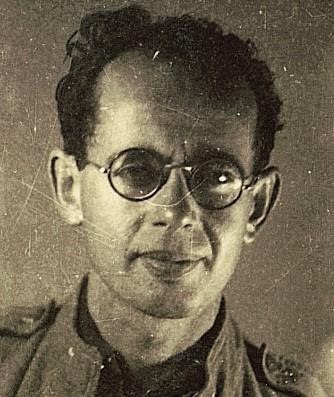 |
|
Haim Ben-Asher, a picture taken by Hanan Bahir
|
However, the two insisted and encountered aggressive resistance. Ze'ev Aner recounts an incident in which Avraham Herzfeld called them fatsos while shouting, pounding with his fist on the table and threatening to throw them out of the Histadrut if they settled on the land. The two 'fatsos' were of course dumbstruck. It was not the reaction they had anticipated. (See Aner, page 40).
They refused to give in, and on Passover evening in 1928 they disassembled their shacks and moved to the new territory. Bondy says that those who were hesitant became convinced. Most members saw Enzo as a creature from another planet, surpassing them in education, knowledge, personal ties and leadership capabilities. If he wants to share his life with them, who are they to refuse? If he, a doctor with a steady job and a family, is willing to follow them to the wilderness, then the settlement must have a future, whether legal or not (Bondy Hebrew version page 122).
The young settlers competed against Smilansky on purchasing an additional nearby piece of land. Henkin offered it to Enzo and demanded 1,000 lire as down payment. Alfonsa and Samuel, who arrived from Italy to visit their recently born granddaughter Hagar, brought with them 500 lire as present. After some efforts, Berl was convinced and agreed that Hapoalim bank would provide a guarantee for the remainder of the sum.
"Enzo took his mother to the sandy area covered with wild grass where lizards were the only living things visible, and proudly pointed out to her: 'Here will be the central dining room, here the dwellings, here the farm buildings, and here the cultural center- a model collective settlement'. Alfonsa understood and sympathized, just as she had understood when Enzo as a schoolboy, dreaming of a just division of wealth among the children, had collected the ten o'clock snacks the children in his class had brought from home and divided them equally between all the kids, rich and poor" (Bondy, location 1751).
I our days, when Kibbutzim deal with legal problems pertaining to redesignation and registration of lands received decades ago from the settling authorities, the uniqueness of Givat-Brener, as a Kibbutz founded by donations from Italy and Germany, stands out. In a TV report by Emanuel Rosen, the 97- year-old Yaakov Zak, the Kibbutz's treasurer in Enzo's days, recalled how he convinced Sereni to raise the money for purchasing the land. He told him that he was one of a kind, a man who had the intelligence of a professor, the temperament of an Italian and the chutzpa of a Jew. Zak also notes that it was in accordance with those features exactly that Sereni behaved and every door would open for him. He mentions an incident in which Sereni turned to Henkin and the latter asked for a guarantee. Enzo replied that he was a serious person, a father of two daughters, and that was enough (See Rosen, minute 6.4).
Aner further mentions that Herzfeld participated in a party to celebrate the successful settlement of the land and told the settlers that he promises them work but can't help them yet with food supply (See Aner, page 41, and footnote number 1).
Enzo disagreed with the ideologues who believed in the founding of small Kibbutzim populated by tight knit groups and allowed the admission of members from disparate countries. In its initial stages, the Kibbutz was composed of two main groups: one consisting of German emigrants and one comprised of Lithuanian emigrants. The two groups sat separately from each other in the dining room. Enzo would run around between the camps, declaring that he is neither Ashkenazi nor Sephardic, but Roman. He felt close to the German emigrants due to their western education, and to the Lithuanians due to their roots in the Jewish tradition. Only in the following years did members of the opposite camps started marrying each other and the differences were blurred.
Moshe Beilinson, who was Enzo's mentor and friend, initially disapproved of his transition to the Kibbutz. He feared that Ada, who came from a rich family, would succumb to despair and eventually convince Enzo to leave. However, Ada had enough of the life of seclusion in Rehovot and agreed to move to the Kibbutz even though the living conditions there were even harder. Enzo shared with his friend the gratitude he felt for her and quoted the biblical verse: "I remember the devotion of your youth, how as a bride you loved me and followed me through the wilderness, through a land not sown" (Holy Bible, New International Version).
In 1,930 Daniel was born. The first son of the Sereni clan who until then had been blessed solely with girls. Ada did not take an active part in the Kibbutz gatherings, but sometimes rebelled, especially when decisions concerning children's upbringing and education that she disapproved of were made. She replaced Geula Shertok as the manager of the clothing warehouse. Geula purchased fabric for work uniform, and her constant attempts to save money resulted in unwearable clothes. Ada, despite criticism, purchased high quality fabric, claiming that poor people cannot afford to buy cheap items. The new clothes that were sewed lasted for many years indeed.
The female German emigrants brough with them high quality clothes, thereby arousing envy. Ada suggested a personal budget for clothing but the proposal, which seemed revolutionary at the time, was decisively rejected. However, the issue of Clothing was less pressing. It was shoes which posed the real challenge: due to shortage of pairs which were wearable in an urban environment, an arrangement was made: whenever a member would go to the city, she would meet another member who was on her way back and the two would exchange shoes at the bus station. Vera Weizmann, who was living next door the Serenis while their house in Rehovot was being built, recounted how Ada had starred at her Shoes closet with longing.
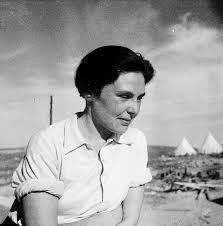 |
|
Ada Sereni. Photo taken by Hanan Bahir
|
"As against Ada's restrained behavior, courtesy, and inner calm, Enzo was regarded by the members as a bit of a wild man. He could not sit still in the dining hall and wondered among the tables, helping himself to food on other's plates. Meeting some members of the kibbutz in town he would invite them to join him in an ice cream bar, then vanish when time came to pay" (Bondy, locations 2071 to 2079).
"In the social landscape of Eretz Israel- the land of Israel- made up of pioneers from eastern and central Europe, Enzo Sereni was unique. There was no one like him either before or after, and, though he gained admiration and love, to some extent he remained isolated. He was different, exotic, Italian, rebellious, too much the individualist. During the bloody Arab riots, he remained a pacifist, and he advocated cooperation between Jewish and Arab workers while the struggle was on for the employment of Jewish labor. Though keenly political, he at first refused to join a political party, and even after he had joined Mapai- Labor party of the land of Israel- he retained his ideological independence, especially as regards relations between the Zionist movement and the Arab national movement" (Ibid., locations 223 to 231).
The Sereni Brothers
Bondy writes that if it was difficult to argue with Enzo, arguing with the three Sereni brothers at once was virtually impossible. The house in Cavour Street was a gathering place for their friends. There was something about the three energetic, aggressive and erudite brothers, with the concentrated gaze in their eyes, that impelled those around them to engage in verbal fights. The younger ones among their friends were powerless. Many of them needed to distance themselves from the brothers in order to free themselves of their authority (Bondy Hebrew version, page 54).
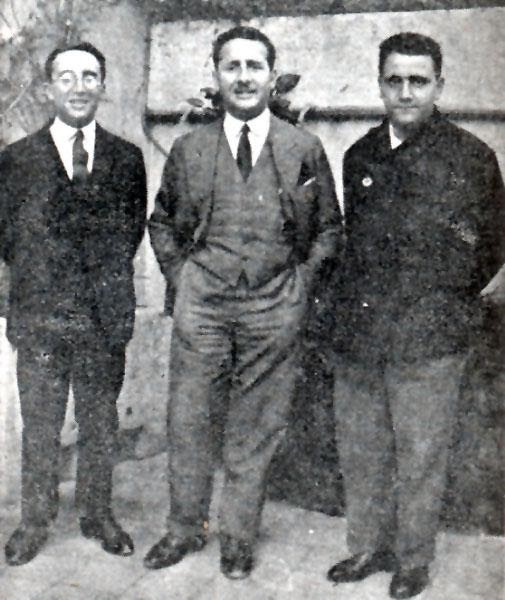 |
|
From right to left: Emilio (Mimo), Enrico and Enzo
|
Enrico, the eldest brother, married Dvora Rabinowitz-Teomim, granddaughter of Jerusalem's Chief Rabbi, ADeReT, and a relative of rabbi Cook. She came to Italy to study Biology. Enrico was considered an eligible bachelor in the Jewish community and nobody could figure out how the foreign student had succeeded where all others had failed. Enzo visited her parents' house and reported to his family regarding the young future bride's respectable origins.
Mimo drifted away from the Zionist dream and became a Communist. He began courting little Xenia, daughter of a Jewish Socialist revolutionary who was hung in Russia and whose Christian widow fled to Italy with their little daughter, with whom she shared the same name. The widow opened a small guest house whose residents were mainly Jewish refugees she took care of loyally. She believed that her and her husband's bitter fate was a punishment for driving their daughter away from her father's Jewish heritage. Therefore, she sought the company of Jews. Moshe Beilinson became her close friend and through him she befriended the Sereni's. When Mimo married little Xenia, nobody was surprised. After the Fascists had risen to power he was arrested as a Communist and Xenia moved to his parent's house.
|
|
| Little Xenia and her mother |
Enrico attended a scientific conference and followed his friends' advice to avoid returning home: as a liberal Socialist who had ties with the anti-Fascist resistance he was in danger as well. Dvora and her daughter also stayed in the parent's house and Alfonsa, who took care of her two daughters in law, was like a rock for all to lean on.
In the early days of Fascism Jews were not yet persecuted so Samuel still worked for the royal palace. He asked the queen to interfere on behalf of his son. He was told that if Mimo denied his affiliation with the communist party, he would be released. The parents had been given a special permit to visit their son in prison and delivered the message. Mimo sensed that his mother, who always taught her children to stand behind their decisions, was not happy with the denial. He eventually refused to deny his connections with the Communist party and was sentenced to twenty years in prison. While incarcerated, he started learning Chinese after he had mastered Russian.
Enrico united with Dvora and little Ada in Paris and from there they proceeded to the land of Israel. He was received with honor and lectured at the Hebrew University, but when the manager of the aquarium in Naples notified him that he is safe from harm- the family returned to Italy. Ada joined them with her three children, mainly to raise money to save the kibbutz from starvation. The land of Israel experienced a new surging wave of unemployment and a profound economic crisis. Members of the kibbutz worked in the dead sea in hard labor that only few could withstand and agreed, in opposition to the party line, to work for Moshe Smilansky for low wages. Enzo sent Ada letters expressing distress, and she managed to organize 1000 lire from Enzo's parents as a loan. The money was taken from their hard-earned savings, mainly due to Alfonsa's insistence to do everything herself. Enzo's parents were perhaps happy with the help they provided their son, but the kibbutz itself seemed to them as a bottomless pit.
Enrico, the brilliant scientist, died suddenly of gas poisoning while taking a bath. Dvora and little Ada moved in with Alfonsa, who took care of the little girl while Dvora would go to the lab to work.
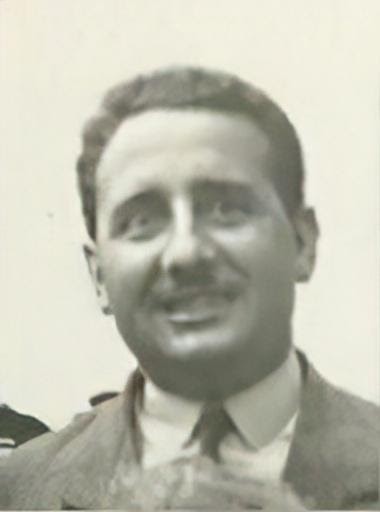 |
|
the eldest brother Enrico Sereni
|
In later years, Dvora and her daughter Ada would immigrate to Israel, and Ada Sereni-Feinberg would become one of the founders of a kibbutz named Yir'on and the seventh member of the Knesset, the Israeli parliament. In her memoir she wrote that upon her arrival in Israel with her mother in 1934, Enzo made them feel welcomed and loved. She speculates that he may have felt responsible for her after the passing of his older brother. Each time he went on a journey or a mission, he would send her a postcard from the faraway land. Moreover, when he would come home, he would bring her a gift, just as he used to do for his own children (See Ada, page 10).
Enzo had gone to Italy to attend the funeral, and while there received an offer to represent the youth movement 'Immigrants' alliance' in Germany. Some members expressed disagreement, claiming that Enzo was too valuable for the kibbutz. Others also added that "Enzo did not seem to be the right person to deal with German youth, known for their thoroughness and restraint" (Bondy, location 2278). Finally, it was decided that he would go for a trial period, and on April 1931 the family left for Berlin.
Emissary in Germany
"Young German Zionists who first saw the new emissary did not know what to make of him. He was short, carried a bundle of newspapers under his arm, dressed in a raincoat that descended to his ankles, and wore a cap far too large for him- both provided by Givat Brenner's collective supply room. From under the cap, behind a pair of glasses, his eyes gleamed as if a light had been lit in them, and he spoke rapidly about any and all subjects" (Ibid., location 2293).
Bondy notes that members of the youth movements who overheard Enzo using Marxist argumentation with a group of Communists one day, and then switching to theological, messianic and eschatological discourse with Buber's disciples on another day, saw his behavior as Machiavellian, hypocritical and dishonest. They demanded a clear answer from him and insisted on knowing his real opinion. Enzo dismissed the question and maintained that all paths- whether Socialist or religious- lead to Zion. The style of argumentation was insignificant for him. Only the goal counted. And the goal was to build the land of Israel as fast as possible (Bondy, Hebrew version, page 169).
"The graduates of the Jewish youth movements displayed a good deal of cultural snobbism. They judged a person by the level of his education, his familiarity with the worlds of music and literature, especially avant-garde literature that had not yet become popular: Kafka, Proust, Kierkegaard, Thomas Mann. Their superiority stood them in good stead when meeting with Yiddish-speaking emissaries from eastern Europe, but drew a blank with Enzo who in short order was at home in Berlin's museums and libraries, conducted seminars on the German spiritual giants- Hegel, Kant and Schopenhauer- and quickly demonstrated to his hearers that whatever they knew he knew better. For young Zionists who still hesitated to make a decision, Enzo was living proof that going to live in Palestine did not require a narrowing of horizons, that pioneering in the land of Israel need not lead to cultural deterioration" (Bondy, location 823).
Enzo, who had experienced the intensification of fascism and Mussolini's rise to power, predicted that the severe economic crises would lead to the small mustached buffoon's seizure of power in Germany, and sensed the danger looming over the German Jewry. His intense role as emissary had drained him and he returned to the kibbutz. However, when Hitler seized power, he returned to Berlin with Eliezer Livne and Moshe Beilinson, and this time Ada and the children stayed in Israel. On the boat he met Haim Weizmann, who was heading to Italy to meet Mussolini. The purpose of the meeting was to discuss the possibility of transferring German Jews and their property to the land of Israel via the Boot.
In 1933 Germany, Jews were being fired in masses and violently attacked. Consequently, a crowd of German Jews assembled around the Zionist movement's offices at 10 Meineke Street in Berlin., Haim Arlozorov, who was educated in Germany (where he obtained a PhD for a dissertation entitled 'The Class Struggle In Marx's Thought'), absorbed its culture and was attracted to Zionism through the influence of Dr. Israel Reichert- shared with Enzo a compelling need to stand by The German Jews in their hour of distress. In May 1933 Arlozorov and Sereni participated in a massively attended seminar organized by the 'Halutz' movement in Berlin with the aim of speeding up the immigration of intellectuals. Arlozorov had returned to Israel to meet the high commissioner and discuss the possibility of increasing the number of certificates. Unfortunately, he was murdered on the shore of Tel-Aviv.
Bondy writes about the intensity and diversity of Enzo's activities in Germany. One day he would be seen in a dark elegant suit and a businessman hat, and in the next with casual clothes. One day he would be in Stuttgart and in the following in the training farm. In the morning he would talk to the community's wheeler-dealers, at noon shove money into his shoes and in the evening dine with the Varburg family. Berlin was the focal point of events which would determine the fate of European Jewry, and Enzo was at the center of it all (Bondy Hebrew version, page 200).
In Berlin, he met Margot Mayer, a bohemian photographer who would eventually become the wife of General Itzhak Sade. Upon her arrival to the offices of 'HeHalutz', Enzo noticed her unique personality and asked her to work as his personal secretary and the secretary of the movement.
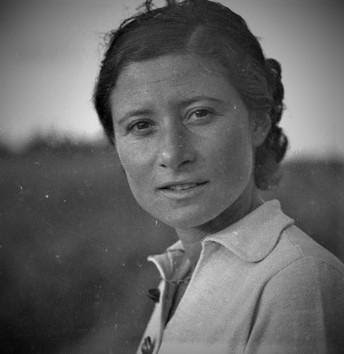 |
| Margot Meyer Sade |
They were similar in their adventurous natures, their willingness to take risks, and their flexible work routine: Margot would play Tennis during the regular working hours, a habit that made her co-workers mad. However, she would make up for it by burning the midnight lamp and working during the weekends.
In a biography Naftali Ungar dedicated to her, he also describes Enzo's personality, and notes that it was harmonious and conflicted at once, but above all impulsive. Ungar describes Sereni as someone that would act out of intuition and thereby win the public's heart. He mentions the time Enzo spent as emissary in Germany as an example and notes that initially he knew little about its Jewry. However, he perceived, as if with a special sixth sense, the historical moment, and realized he was facing this community as a guide in times of perplexity" (Margot, page 45).
Together, Margot and Enzo ran a network for smuggling Jewish money that operated Enzo style, namely, with maximal improvisation and minimal bureaucracy. Records were hastily documented on notes shoved into pockets, and the whole procedure demanded a great deal of personal courage. The estimation is that by 1939 fifty million Lire Sterling had been brought to Israel, only a third of which through official channels.
Back to the Kibbutz
The restless Enzo fluctuated between two forces: a sense of home sickness and a desire to return to his family on the one hand, and a voice propelling him to keep roaming on the other. Even as emissary in Germany he made sure that resources were allocated to Givat Brener, which in the meantime became a center for the absorption of young German immigrants.
In his book Idea and Money, Yaakov Zak says that Enzo took care of the economic aspect, and particularly stood out among those who took part in fundraising. He adds that Sereni knew how to use his good personal ties and frequent trips abroad for the benefit of the 'Keren' and his kibbutz Givat Brener. He also relates that accurate data on the results of this activity is unavailable because it was largely dependent on personal ties and conducted mainly in Germany and Italy" (See Zak, page 60).
A contribution made by Lola Han Warburg, whom Enzo had met in Germany, made it possible to build a culture room with a high-quality library. Enzo organized culture events and was also preoccupied with accommodating the sanitation and housing conditions to the absorption of more German youth.
In the relatively calm days, he tried to write a study about the young Karl Marx and wanted to "find himself somewhere on a remote island without Jews…." (Bondy, location 2841 to 2850). However, the serene atmosphere was illusory, and due to the gravity of the situation after the Nazi's rise to power, he was called on a new mission, this time to the U.S.A. When the Italians invaded Ethiopia, everyone realized that the Jewish settlement in Israel cannot rely on anyone but itself and that nobody can protect those who cannot protect themselves.
Enzo was of course against the invasion and the Fascist regime but "…a certain spark of Italianness remained with him. He was exasperated with friends who doubted the military abilities of the Italians or ridiculed their 'macaroni' army and barely concealed his satisfaction with the advances of the Italian army in Ethiopia. When a friend asked him bluntly, 'Don't you admire the duce just a little bit?' he thought long and answered: 'Once upon a time there was something to Mussolini. He was a good guy but lost his way. A pity!'" (Bondy, location 2872).
Mimo was released from prison after five years, having been given a pardon by king Vittorio Emanuele. Mimo and Xenia did not trust the authorities and had fled with their daughter to Paris, where they engaged in communist activities and lived off money sent by the Sereni parents and earned by Xenia's sewing work.
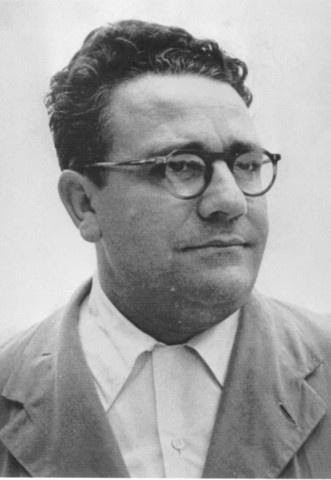 |
| The young brother Emilio (Mimo) Sereni |
Xenia Pampilova, the mother. Followed her friends and settled in kibbutz Na'an. Her daughter was faced with a dilemma: is she, as a member of the communist party, entitled to have relationships with non-communists? When it was made clear to her that 'whoever is not with us is against us' she wrote her mother a letter stating that she wants to sever all ties with her. Xenia fulfilled her daughter's request and never wrote to her again (see footnote 2).
Emissary in America
In January 1936 Enzo sailed to America for a task which initially showed little promise: the Halutz movement consisted of no more than several hundred members spread throughout the U.S.A. In addition, it lacked substantial financial means. The tasks that faced Enzo in America were completely different from those he had to perform in Germany. He knew well that the key to success would be to approach the new project without prejudice and without preconceived notions derived from his experience with other communities. While in Germany the youth came from assimilated families and found its way back to Judaism and Zionism through the encounter with persecutions, in America it was the other way around: support came from senior members of the 'Poale Zion' movement while the younger generation knew only English and assimilated well into the American immigrants society. The emissaries had returned from America with reports filled with satisfaction and praise for the Jewish community's love for Israel, but Enzo was sober. He knew well that the duly impressed emissaries had encountered the devoted and Yiddish speaking members of the older generation, not their children, who felt alienation toward the Zionist idea.
Yehuda Riemer notes that Enzo reported back that it would be a mistake to base the movement's future on the Yiddish speaking groups tied to Poale Zion. He also mentions that Enzo saw them as small groups which are not likely to last into the future. Instead, Enzo targeted the masses of the assimilated youth. He said that their assimilation had occurred in an accelerated speed that would only increase after America recovered from the depression and its democracy would strengthen. To this he added that this young generation lacks any religious or ethnic consciousness and is not attentive to the traditional Zionist message. The only way to win its heart is by adopting a completely Americanized strategy. Riemer adds that these claims reflect Sereni's own way of thinking as an assimilated intellectual (See Riemer, pages 177-178).
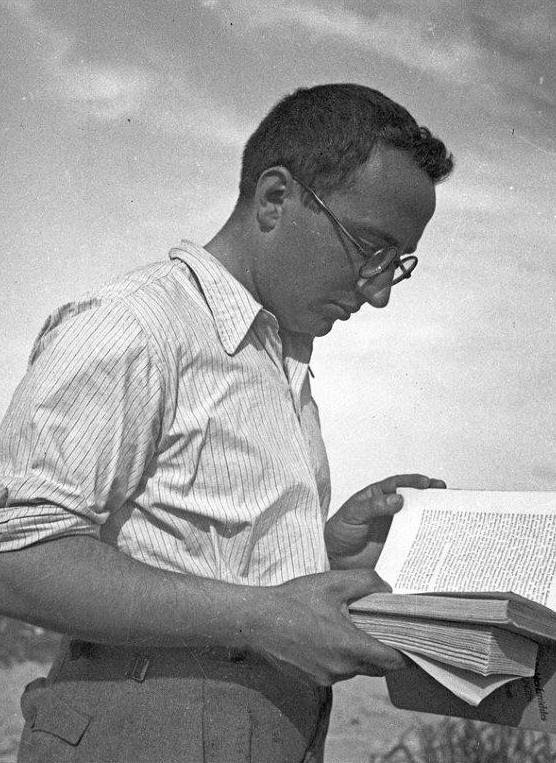
Enzo was wary of the Jewish Youth's growing attraction to Socialism and Communism, and in a conversation with the editor of the 'Poale Zion' journal, he mentioned his plan for dealing with the 'red assimilation': "I'm an expert in basing Zionism on Marxism." To the interviewer's question whether he was a Marxist he replied as if it was an insult: "What do you take me for? An idiot?" and then burst with laughter of pleasure (See Bondy, Hebrew version, page 229).
"The age differences within the top leadership of the labor movement and Enzo was not great, yet he belonged to another generation. Golda Meir, who was in the United States on a mission for the Histadrut at the same time that Enzo was there, felt this difference between herself and Enzo, and once asked Saadia Gelb, one of the leaders of the Bonim organization, to explain to her why Enzo was regarded as part of the youth movement, and not she; why he was invited to address youth meetings as one of their own, while she, who was his senior by a mere six years, was only invited as a guest of honor." It was true that in addition to his personal charm, which always attracted a stream of devotees, he was primarily influential by means of the frankness with which he talked to the youth about the Zionist cause, thus making them feel they were partners in the work. When Golda, who grew up in Milwaukee and knew American Jewry well, heard Enzo discuss the Arab problem, she was concerned. She feared that the enthusiasm of young American Jews might be blunted, and they would come to entertain doubts about the Zionist work as a whole. Years later she admitted that Enzo's frankness did not diminish their interest but might have been the very thing that that attracted them and convinced them more powerfully than other arguments" (Bondy, locations 3149 to 3156).
The 'Events' that took place in Israel in 1936 caused young people who were influenced by the Communist propaganda to raise hard questions regarding Jewish-Arab relations. Enzo would reply according to his own world view, which deviated from the accepted political line substantially. He claimed that the land belonged to Jews and Arabs alike, and broached the idea of an all-regional Arab federation which would include the Jewish state. Riemer mentions Bebe Idelson, Hahistadrut's emissary for the 'Pioneer Women', as someone who explicitly complained about the questions directed at her at meetings regarding the Arabs. She was also displeased with the need to constantly defend herself and explain that the Jews hadn't stolen anything and hadn't taken advantage of anyone. Riemer also notes that she explicitly accused Grinberg and Sereni for creating this situation and for inflicting great damage upon the movement (See Riemer, page 186).
Enzo resolved to purchase a 140 acres training farm with a nearby stream, a pool and a big dining room. As usual, the move involved a considerable financial risk that proved itself, with the passage of time, as an excellent deal. At the Cream Ridge farm, he and Zalman Rubashov held a summer seminar that was a resounding success.
Rubashov (later to become president Zalman Shazar), drew Enzo closer to the Jewish faith, even though he came, much like Enzo, from a Socialist background. Enzo's connection to his Jewish roots evinced itself in the addition of the name Haim and in the fact that he sometimes spelled his name in a Yiddish style, namely, with the Hebrew letter Ayin. He also tried to study Yiddish. Once, while he was walking along a New-York street with the editor of the 'Poale Zion' journal, he asked the latter: If Zionism is defeated, who will you join, the communists or Agudat Israel? The editor had decisively replied that he would join Agudat Israel. Then, Enzo patted him on the shoulder and said, 'now I know that you are a good Zionist'. Moshe Beilinson had died in November 1936 from a heart attack and Enzo felt loneliness and the loss of a connection to a dear friend and a mentor.
As a boss, he paid little and demanded a lot, albeit mostly from himself. Bondy mentiones an incident with his office workers. One day they resolved to teach Enzo, who behaved like a dictator and treated them as slaves, a lesson. When he entered the office they stood to attention, raised their hand with a Fascist gesture and called as one: 'Il duce'. Enzo did not even bat an eyelid. He responded with a friendly 'ciao' and sat behind his desk as if nothing had happened. Everybody was mad at him and everybody obeyed him (Bondy Hebrew version page 243).
The tendency to obey him was not restricted to professional matters. It expressed itself in personal issues as well: One of the young people who fell under his spell was Joe Kreidin, who would later become Kol Israel's vehicle expert. Enzo made up his mind that Joe should get married and volunteered to find a bride for him. One day he introduced him to a girl named Ruth and said 'she's the one. Marry her.' The two were embarrassed at first yet talked, found common ground and eventually got married.
In New-York, he would celebrate in Italian restaurant and befriend all the waiters. He had an emotional meeting with mayor Fiorello la Guardia: two short Italians who spoke with hand gestures and loud voices, often simultaneously, interrupting each other as they speak.
Enzo's role as emissary lasted for 15 months. Its main contribution was his influence on several people who fell under the spell of his personality and the formation of personal friendships which remained alive in people's memories for years after his tragic death. Sereni himself considered returning to America for another attempt, and Riemer notes that perhaps this time he would have found his way to the heart of Jewish youth, maybe through a different organizational framework, but sadly, the opportunity wasn't granted to him. Riemer concludes that his mission in America seems as a stormy episode that provided momentary hope but eventually did not lead to the sought for breakthrough (See Riemer, page 198).
Enzo and Ada decided to celebrate the last Seder before they left the U.S with a small group of friends: members of the commune with whom they shared the apartment and five of six additional guests. However, Enzo invited in passing virtually every person he had met in New-York, and it became clear that more than 100 people would show up. Ada cooked an enormous amount of eggs and the commune members bought matzoth. Many people came, including Golda and Rubashov. People sat on the floor, "….ate anything they could get; it was a mad, unplanned evening but one that people remembered with pleasure for years to come" (Bondy, location 3250 to 3257).
The great unfinished novel
After his role as an emissary in the U.S.A had ended, Ada and the children returned to Israel, whereas Enzo went to London to collect material for a study on the development of British involvement in the middle east. The monograph, entitled "The History of British Imperialism in the Middle East" was never published.
Enzo predicted that 'Givat Brener' would become the largest Kibbutz in Israel, and his declarations about 2000 members were met with general ridicule. A member of the movement recounted how he had met Enzo, who came as an emissary from Israel to a training group in the Netherlands. In an article by Amia Lieblich the member tells how he walked together with Enzo along a typical Dutch street which was thoroughly brushed and immersed in vegetation. Suddenly, Enzo turned to him and declared that within thirty years, this is how Givat Brener would look like. The member took him for a lunatic. In his mind, the terms kibbutz and the land of Israel associated with images of tents, donkeys and desert. However, later he could not help but wonder how Enzo had been right and he had been wrong"(Lieblich, page 296).
Aunt Ermalinda loaned money for the construction of a regional school and sent study materials that had been given to her by a friend of Maria Montessori, the Italian educator who developed advanced educational methods.
The Kibbutz started to preserve the excessive agricultural produce for rainy days, and the enterprise was headed by Ada. It was the first time she showed the members she had her own personality and resources. Her (make sure it's Ada's sister) sister Lea, together with her husband and children, immigrated to Israel and lived in a building next to the Kibbutz. The parents hesitated but finally immigrated to Israel as well. Aunt Ermalinda, for her part, who viewed herself as Italian, refused to come. Enzo, who was 'the Chief Commissioner for Italian emigrants' affairs' in Israel, felt personally responsible for the absorption of pioneers and bourgeois alike, and handled each one of them personally.
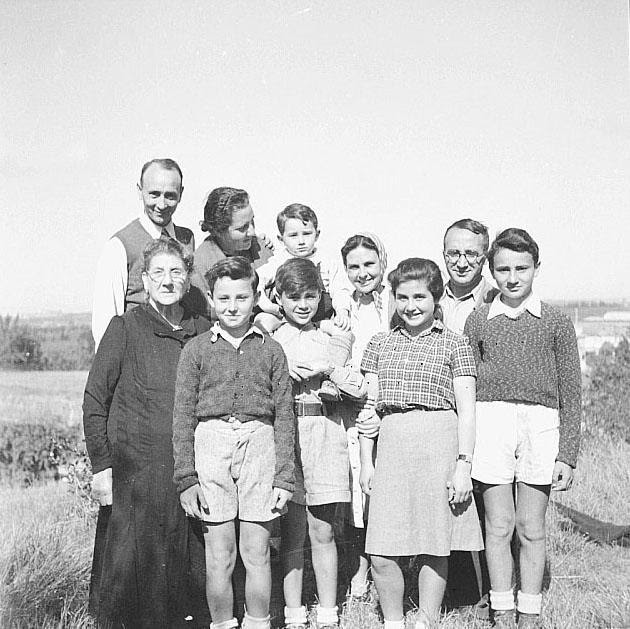 |
|
With sister Lea and her family in Givat Brener. Photo taken by Hanan Bahir
|
The situation in Europe necessitated his return, and while in the Netherlands he wrote about the dread he sensed:"I am staying in the modern 'American' hotel, in a spacious room I can never dream of in Palestine……But I am in the midst of a destroyed community. 1939 will no doubt be remembered as a fateful year in Jewish history. In 1933 one could still hope and live in illusions. Now all that is past. Refugees from Poland bring tidings of the total destruction of Jewry in its last historical center. Every Jewish refugee has the face of a hunted animal seeking escape from mighty forces that have determined to erase the name of Israel from the world" (Bondy, location 3540).
Bondy mentions a letter Enzo wrote to his daughter, Hagar. In the letter, he tries to explain why he was always traveling and sometimes so busy that he did not find time to be with his family. He describes himself as a messenger on behalf of a poor and oppressed people that nobody loves and that desperately needs help in building a new homeland (Bondy, Hebrew version, page 282)
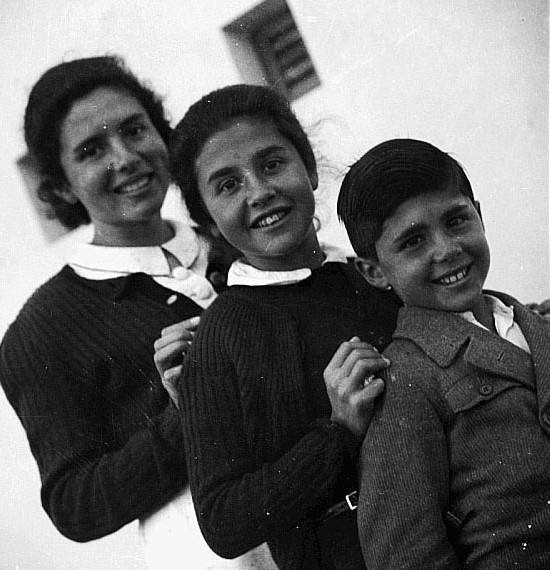 |
|
Hannah, Hagar and Daniel
|
Throughout his life, Enzo dreamt about writing a masterpiece that would reflect the nature of his generation and recount the history of his Roman family against the backdrop of the intense period between the two world wars. The tragedy that had befallen the Italian Jewry led him to abandon his scholarly work and return to his literary dream. He would write entire scenes while riding the bus, but he never had the time to fully develop his fiction writings since life itself demanded all his powers.
In the introduction to the Hebrew version of her book, Bondy writes about Enzo's ablity to cram into less than forty years of human life an enormously rich variety of roles and activities. He studied Philosophy, wrote studies on the young Marx, the British Imperialism in the middle east and the roots of Italian Fascism. He became a halutz in Israel during times of hunger and struggle for work, established a collective settlement contrary to the decisions of the national authorities, showed the Jewish youth in Germany the path to the land of Israel during the fateful period of Hitler's rise to power, lay the foundations for the mass immigration of Iraqi Jewry, worked for the British intelligence among the Italians in Egypt, took part in the anti-Fascist resistance, roamed around the globe, struck roots in the land of Israel, loved people, books and food, worked as a journalist, treasurer, farmer, youth guide, secret agent, emissary and historian, became a family man, acrued friends on every road he travelled, and more. Reading this list, one realizes that Sereni did not write the great novel by pen, but rather lived it stormily (Bondy, Hebrew version, page 11). "His life was a work of art, the writing of it was left to others" (Bondy, locations 198 to 206).
The issue of Arabs in Israel
In his book 'From Tuscan Hills to the Negev Desert', Joel de Malach mentions a story by Enzo's niece, sister Lea's daughter. She recounts that Enzo had a unique outlook on the relations with the Arabs. When his turn to guard came, he refused to carry a rifle, opting for a stick instead. Despite past events he had friends in the neighboring village Zarnuga. Enzo's niece adds that in one of the first Saturdays after their arrival, Enzo took advantage of the pleasant weather and took a group of youngsters to visit the village. The significance of the event was lost on those who came from afar, like herself, but it was a significant event nonetheless: the first time Jews peacefully entered an Arab village after the 'events'. She remembers Enzo meeting some friends, hugging and kissing them, to her surprise, and an Arab man, sitting at the entrance of a Café and reading a newspaper. One of the youngsters told her, surprised, 'look, an Arab reading a newspaper'. The Arab, who was not only literate but also understood Hebrew, responded with 'Lo and behold, an Arab who can read a newspaper!' (see de Malach, page 47).
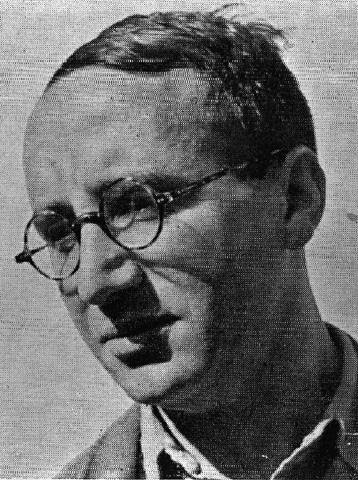
Enzo identified with the line taken by 'Poale Zion Left', which founded 'Achvat Hapoalim', a joint Israeli-Arab workers organization. 'Poale Zion Left'. endorsed a position that was contrary to that of Berl Katznelson. The latter visited Givat Brener in 1930 and gave, with his distinctive voice, a speech that lasted four consecutive hours in which he expressed his disapproval of 'Achvat Hapoalim' On the grounds that national needs should receive precedence. Enzo retorted in a speech that lasted for an hour and a half but failed to convince his peers who referred to him in ridicule as 'Brit-Shalomnik'.
The comparison he made, on various occasions, between the Arab nationalists on the one hand and Mazzini and Garibaldi on the other, evoked rage. As Bondy notes in her book, In one of the many debates he said that some members sentenced him to death due to his opinions regarding the Arab and added that his aversion of power does not stem from cowardice, but rather from the realization that sometimes avoiding shooting is more revolutionary than shooting to soon. (Bondy Hebrew version, page 270).
On the other hand, Yehuda Riemer notes that his positions were not always consistent. For example, a few years later he supported the idea of transfer, and expressed it quite bluntly (See Riemer, page 187).
Emissary in Egypt
After Italy had joined the war as a force siding with Nazi Germany, the British arrested everybody who had Italian citizenship, Enzo included. Haim Weizmann had him released and Enzo, who did not hold a grudge against the British due to his arrest, even asked to enlist to the British army to fight the common enemy. He estimated he could contribute to the war effort by operating among members of the Italian colony in Egypt, and among Italian captives who were held there. Moshe Sharett advised the British to trust him and mentioned his extraordinary intellectual skills.
Enzo had arrived in Egypt in September 1940, but the British were in no hurry to take advantage of his abilities. Consequently, he had an abundance of free time which he used to study the Arab language. "The encounter with the ruling elements in Egypt- corrupt, satiated, given to intrigues, consumed by greed- on the one hand, and with the mass of people- ignorant, pitiful, fatalistic- on the other, with their concealed or open admiration of Hitler, convinced Enzo of the remoteness of the vision of the worker's solidarity that was supposed to solve the problems of the region. It was a different Enzo who returned from Egypt. He declared: 'I was in Egypt for a few months, and I must say I have cooled off toward the Arabs. I have a lower opinion of them now than I did before'" (Bondy, locations 3709 to 3720).
Enzo had bitter arguments with the British over the way to approach the Italian people. In his mind, they made a mistake when they violated the Italian honor. Bondy writes how he waited in vain, while listening to Churchill's speech, for a direct appeal to the German and Italian people, who would become the next day's allies. Enzo believed that crushing the Nazi beast would require the joint efforts of all Europeans, Germans and Italians included, over the heads of their temporary regimes. Churchill's V expressed for him 'Vitoria', 'Vendetta' but above all 'Vitae'. We are the troops of the victory of life, fighting against those plotting to destroy us, he once said (Bondy Hebrew version, page 312).
He was eventually authorized to edit a newspaper in Italian and broadcast to territories under Fascist occupation. Enzo approached the Italian population over the head of the Fascist authorities and tried to create a rift between the people and the regime. Sharett, who witnessed him deliver a speech, wrote in his memoir how thrilled he was to see Enzo giving a speech. He describes him as a short statured man with dark and shining face Standing in a small room while his voice reverberating far, all the way to the land his soul longed for. Sharett says it was like watching a torch suddenly light up in darkness, igniting an ancient divine flame meant to wake up an entire nation from its slumber (See Bondy Hebrew Version, page 306).
Enzo's independence, his massages, which were not always in harmony with the official line adopted by the British, informings by political opponents and intrigues, eventually got him fired. When the British had realized that he had no intention of leaving Egypt, and that he was planning to continue his work there independently, they had him arrested by the Egyptians under some false pretext. Mosh Sharett operated to have him released and in December 1941 he returned to Israel to the Sereni clan, which welcomed him with open arms.
Emissary in Iraq
On April 1st, 1941, an uprising broke out in Iraq, and a group of pro-Nazi army officers headed by Rashid Ali al-Gaylani seized power. Incitements and assaults against Jews increased, and in the big cities demonstrations were held, ending on more than one occasion with attacks against Jews. In June, particularly violent riots named 'the Farhud' broke out.
Some of the Jewish youth started to organize for self-defense. In March 1942 Shaul Meirov (Avigur) headed to Iraq. He was a veteran Hagana member who headed the institution for immigration B, a small organization founded in 1934 for dealing with illegal immigration to Israel. Avigur was seeking someone who would coordinate the activity in Iraq and Enzo's name came up. Doubts had been raised regarding his extrovert personality and conspicuous behavior, traits which are diametrically opposed to those expected from of a secret agent, but it was eventually decided that his special skills would compensate for these shortcomings.
Enzo, whose underground nickname was 'Ehud', headed to Iraq in April 1942.
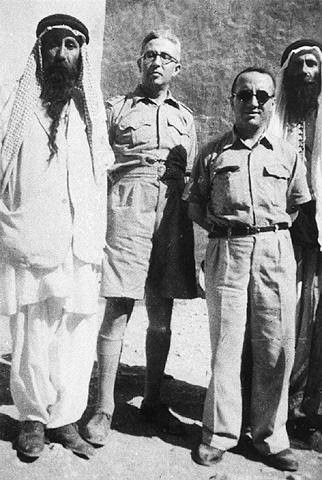 |
|
As an emissary in Iraq
|
One of the first things he did after he had arrived in Iraq was to arrange the Arab translation of the article 'He Told Her', which Brenner wrote following the pogroms in Russia and which called for Jewish self-defense. Enzo and his colleagues swore in the youngsters who joined the 'Hagana' to the light of candles illuminating a bible book. The young newcomers took an oath to defend the Jews of Iraq, to devote themselves fully to the cause and to be fearless, even in the face of death. For the first time, ammunition began to flow in the opposite direction, from Israel to Iraq, and Enzo's friends interpreted his actions as a withdrawal from his former Pacifism.
The time he spent among the Iraqi Jews, whose life revolved around their families, reminded Enzo the separation from his own family. Bondy writes that the Baghdadi winter was rough. The chill penetrated the bones, and the hotel room lacked proper heating. Enzo missed home and would frequently tell his friends about his family. Here, in Iraq, there was no room for flirtations and fleeting love affairs like the ones which popped up in previous years. However, Enzo's abstention was also guided by principles. He told one of his friends that he is through with women now when Jews are being eradicated around the world (Bondy, page 346).
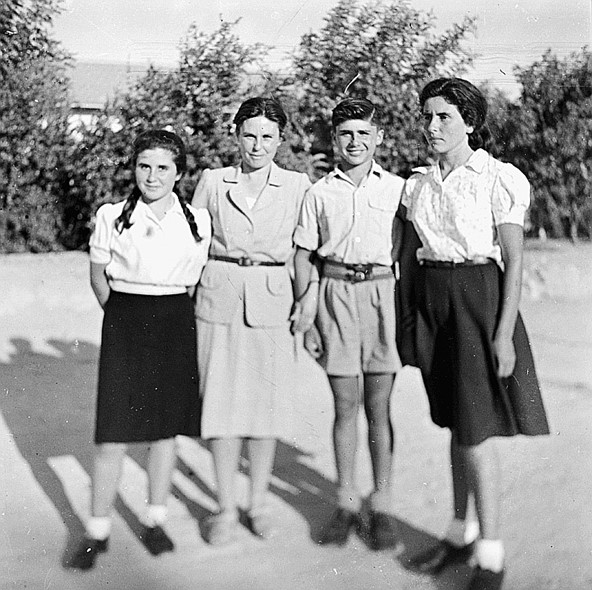 |
|
Ada and their children
|
Two men shared the workload with him: Shmaria Gutman, the archeologist of Masada, who came from kibbutz Naan, and Prof. Gideon Mer, a Russian born Rosh-Pina resident who was a tropical disease expert and a British army specialist whose work focused on the elimination of malaria. In his youth he was Trumpeldor's adjutant, and a Zionist adventurer (see footnote 3). All three held the belief that scientists must play an active role in life and avoid secluding themselves in ivory towers. Enzo continued to study Arab and had delved deeply into the history of the area until his knowledge exceeded that of most locals.
When Moshe Dayan visited Iraq, Enzo urged him to take advantage of his presence in Baghdad and visit the antiquities museum. While they were touring the Museum, Enzo was talking about ancient Mesopotamia, its prodigious prosperity, its irrigation enterprises, and the cultural decline that ensued. In addition, he enthusiastically pointed his finger at the rare writings from the Hammurabi era. Bondy writes that Moshe Dayan, a self-professed ignoramus, found it difficult back then to understand what was so exciting about antiques (Bondy Hebrew version, page 336).
Enzo visited the Yazidi tribes and showed special interest in their unique religion. Shmaria Gutman pondered the possibility of incorporating them in the efforts to smuggle Jews, since they were also victims of the Muslim zealous violence. However, they were too detached and were not even aware of the world war taking place outside.
In Israel, little was known about the Kurd Jewish community. Enzo went to visit them and discovered a whole new world. Bondy describes his impressions. Enzo recalled an hour and a half car ride from Mosul, through beautiful mountains, followed by a walk on a road that led to Turkey and resided between two rock walls, then a passage through an entirely green vadi immersed in orchards, apple. pear, plum and pomegranate trees, and finally the arrival to the village, which was like an independent Jewish republic. He went straight to the Muhtar. Almost everyone spoke Hebrew and started feverishly asking questions regarding the immigration: How can it be done and when? When Enzo witnessed this, he wanted to take the entire village with him to the land of Israel (Bondy Hebrew version, page 341).
After a while he requested to return to Israel, but Shaul Avigur was reluctant due to the difficulty in finding a substitute that would be able to fill his shoes. Both men were walking down the street while a nationalist demonstration was taking place. The demonstrators were shouting Yahud, Yahud, while raising their fists in the air. "Shaul fell silent, but Enzo reacted in his own way. He recited entire cantos of Dante's Divine Comedy, which in his life filled the same role that the book of Psalms fills in the life of a God-fearing Jew" (Bondy, location 4461).
Even after he had finished his role as emissary in Iraq, he continued to accompany the underground that operated there, to assist its members and help with the absorption of the new Iraqi emigrants.
The last mission
When the crisis in the labor movement ,which ended in a big division, had begun, Enzo was among those who believed it was both redundant and dangerous: he remembered all too well the lessons of the rift within the Italian labor movement, which had occurred when Mussolini rose to power, and the historical analogy terrified him. Enzo endured with pain the preoccupation with petty things while a great tragedy was taking place in Europe. In one of the conferences three Polish refugees talked about the magnitude of the Jewish holocaust. Bondy describes the scene. Outside, a storm was raging and drops of heavy rain were hitting the tin roof. A great melancholy fell on them. Some broke out in tears, others felt helpless and guilty for being where they were, safe and sound, while their family and friends were facing death. Some were determined to head to Europe, in any way possible, to rescue those who could still be saved (Bondy, Hebrew version, page 366). Enzo was among those who resolved to go 'there'.
In the summer of 1942 Moshe Sharett turned to the British with an offer, raised initially by Eliyahu Golomb, the most authoritative figure of the Hagana, to parachute Jewish forces behind Nazi and Fascist enemy lines. Many volunteers signed up for the dangerous mission, and there was willingness to send Jewish commando units. However, the British were reluctant. They hesitated and took their time, because they did not want to deteriorate their relationships with the Arabs, which were already quite problematic. In addition, they thought that given the Antisemitism surging in Europe, it would be better for them not to be associated with Jewish elements. Members of the Hagana had also tried to contact the Americans, the free armies of France, Poland and Czechoslovakia but failed, and the only option left on the table was the British. That option, however, materialized only after the situation of the British forces had deteriorated.
When Enzo heard that the Jews of Rome and northern Italy had been imprisoned in concentration camps, he knew he must act immediately. His friends thought he intends to arrive in south Italy, which had been released by then. Little did they know, however, that his real plan was to land in a northern territory still occupied by the Germans. Before his departure he had met some of his closest friends and told them the truth. They doubted the rationality of the plan and its chances to succeed but relied on Enzo's resourcefulness and his ability to find his way out of any situation. Ada served coffee and her eyes were red. For the first time in their eighteen years of marriage she tried to prevent his departure. Enzo, for his part, was possessed, and nothing could divert him from his goal.
The mission to occupied Italy evinced two aspects of his personality: "He was a Jew and Italian. He made his home in Eretz Israel but remained attached to the Italian landscape. He belonged to the post-assimilation generation, and his return to Jewishness was an act of voluntary choice. A voice within him compelled him to go to Eretz Israel, but part of his heart remained in Italy, to which he kept returning like a migratory bird" (Bondy, location 215).
Ben-Gurion related bitterly, at the age of eighty-four, twenty-five years after the operation, how Enzo's mission had been kept hidden from him. He was aware of the connection that Enzo had with the Italian Jewry but felt that the price had been too heavy: "I would have done everything to prevent it…. There was no replacement for Enzo. There was not another man like him. He was unique" (Ibid., location 4715).
Avi Shilon, in his book Epilogue, wondered whether Ben-Gurion saw Enzo as a potential heir. He says that during the fifties Ben-Gurion thought of the IDF's commander in chief, Yigael Yadin, as a possible candidate for his heir. He also mentioned Dayan as having leadership qualities. At certain times he also referred to Haim Zadok, the minister of development in Eshkol's government, as a potential future leader. In his old age he used to lament that if Enzo Hadn't been captured by the Nazis during his mission, he could have been a political leader (See Shilon, page 213).
In the military headquarters in Cairo there was an atmosphere of resistance to Enzo's departure. The rationale that Enzo himself provided- that he is unwilling to send people to such a dangerous mission without taking part in it himself- offended the other commanders. They claimed that it is sometimes easier to execute than to take responsibility for people's lives. Finally, it was decided to let Berl, Ben-Gurion and Tabenkin settle the issue. Moshe Sharett, who headed the political department of the Jewish agency, passed through Cairo on his way to London, and Enzo explained to him the importance of his mission. Sharett later recounted that Enzo was irresistible. He gave in, agreed to send him to the mission, and due to his high position further consultations were rendered redundant.
During the training and preparations Enzo found time for an exceptional operation: a group of soldiers that included Lova Eliav, told him that a female member of a Kibbutz in the Galilee, who had undergone a psychological crisis upon finding out about the circumstances of her birth, had arrived in Egypt and had become a prostitute serving the British soldiers. They took the girl by force to a house that belonged to a member of the Jewish community and there Enzo engaged in heart to heart conversations with her till her soul started to heal. When she agreed to return, he smuggled her to Israel in a British soldier uniform. The successful completion of the operation was celebrated by the members in the Grupi club, and Enzo taught them to eat Spaghetti in the Italian way.
In the farewell party that the Jews of Cairo organized for him, Enzo showed the participants pictures of Ada and the children, talked about how wonderful they were, and felt remorse over by gone love affairs. He rode with several emissaries in a carriage through the nocturnal streets of Cairo and sang Italian songs out loud.
At a party in friends' house, in which Moshe Sharett, Yaakov Zur, Eliyahu Golomb and Reuven Shiloah were present, the participants had prepared Spaghetti a la Milanese, drunk red wine and sung pioneers songs and Russian melodies, until Enzo's expression turned serious and he said that if he had been able, in some miraculous way, to make Ada and the children appear before him at that moment, even for a split of a second , he would have been happy. He had unintentionally dropped a framed photo, and the sentimental hostess interpreted this as a bad omen, much like the wine Hannah Szenes had inadvertently spilled on a white table map prior to her departure for her mission.
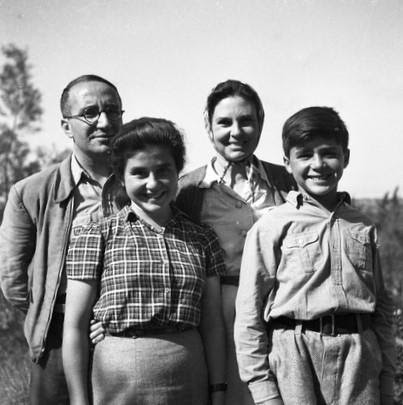 |
|
A picture taken before his departure to the last mission
|
Once he had arrived at the unoccupied territory in the south of Italy- he went to meet the residents of the San-Nikandro village whose story fascinated him. He had his picture taken with them while they were holding the Zionist flag in their hands, and that is the last known photo of him (see footnote 4).
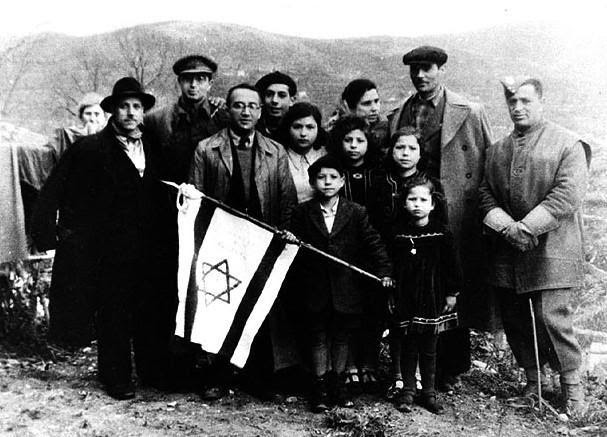 |
|
The last photo with the San-Nikandro residents
|
Enzo wrote a farewell letter directed to Berl, Ben-Gurion and Tabenkin as one. In the letter Enzo expresses his hope to succeed in his mission and see his friends again soon. However, he also acknowledges the possibility that he might not return and thanks the three men for their inspiration. In addition' he asks them to take care of his family when his gone (see Bondy Hebrew version, page 399).
To his friends from the immigration enterprise he wrote about the guilt he felt over leaving them in the middle of the work they had started together. He asks them to forgive him and explains that he could not resist the voice that prompted him to go on the mission (Meirov, page 60).
At the night of the parachuting, in May 1944, a storm accompanied by strong winds was raging, and Enzo fell into the enemy's hands immediately after he had landed. The picture that emerges from survivor's testimonies is that even under the harsh conditions of the concentration camp, and after undergoing torture, he was still able to act as a guide and leader to others. After spending time in various concentration camps, he was executed in Dachau on November 18th, 1944.
Epilogue
After the war had ended Ada went to Italy to track Enzo's fate. She stayed there, even after she had received the bitter news, and for three years worked in managing the illegal immigration enterprise in Italy. At first, she had fulfilled the position of Yehuda Arazi's deputy. After he had left, she replaced him and headed the 'Mossad LeAliyah B' in Italy.
During this time, the organization managed to send more than 20.000 immigrants on dozens of boats which were launched from various sites along the Italian shoreline. In addition, Ada was involved in purchasing weapons, sending them to Israel and preventing the arrival of weapons to Arab countries. Due to her mastery of the Italian language and culture, her grace and wit, she managed to form ties with high ranking figures in the Italian government including the prime minister himself, the police commissioner and the commander of the navy. She was able to convince them to assist her organization and resist the British pressures aimed at preventing the Jewish immigration to Israel. When she returned to Israel, she joined her daughters, who by then had left the Kibbutz, and settled in Jerusalem. Daniel, the only son, "The Kaddish" as Enzo had called him, was killed in July 1,954 with his pregnant wife in the terrible 'Maagan disaster'. Besides them, the incident took the lives of 15 additional people. It occurred during a ceremony commemorating the paratroopers who had not returned, including Daniel's father.
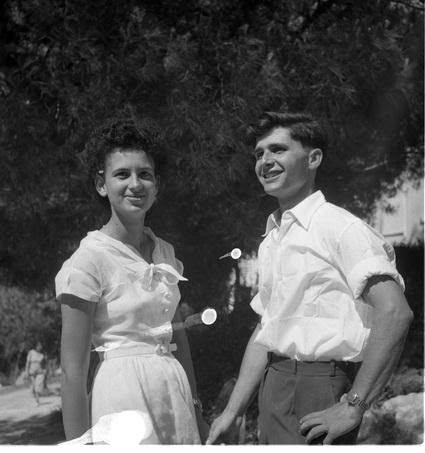 |
|
Daniel and Ofra Sereni in a picture taken by Hanan Bahir
|
Enzo's dream became a reality and today Givat Brener is the largest Kibbutz in Israel. The rift in the labor movement, which Enzo was strictly opposed to, did not spare Givat Brener: Enzo's good friend and partner in establishing the Kibbutz, Haim Ben Asher, founded, together with other friends who left Brener, another Kibbutz named Netzer Sereni, which commemorates Enzo's name.
Written by Aliza Greenbaum